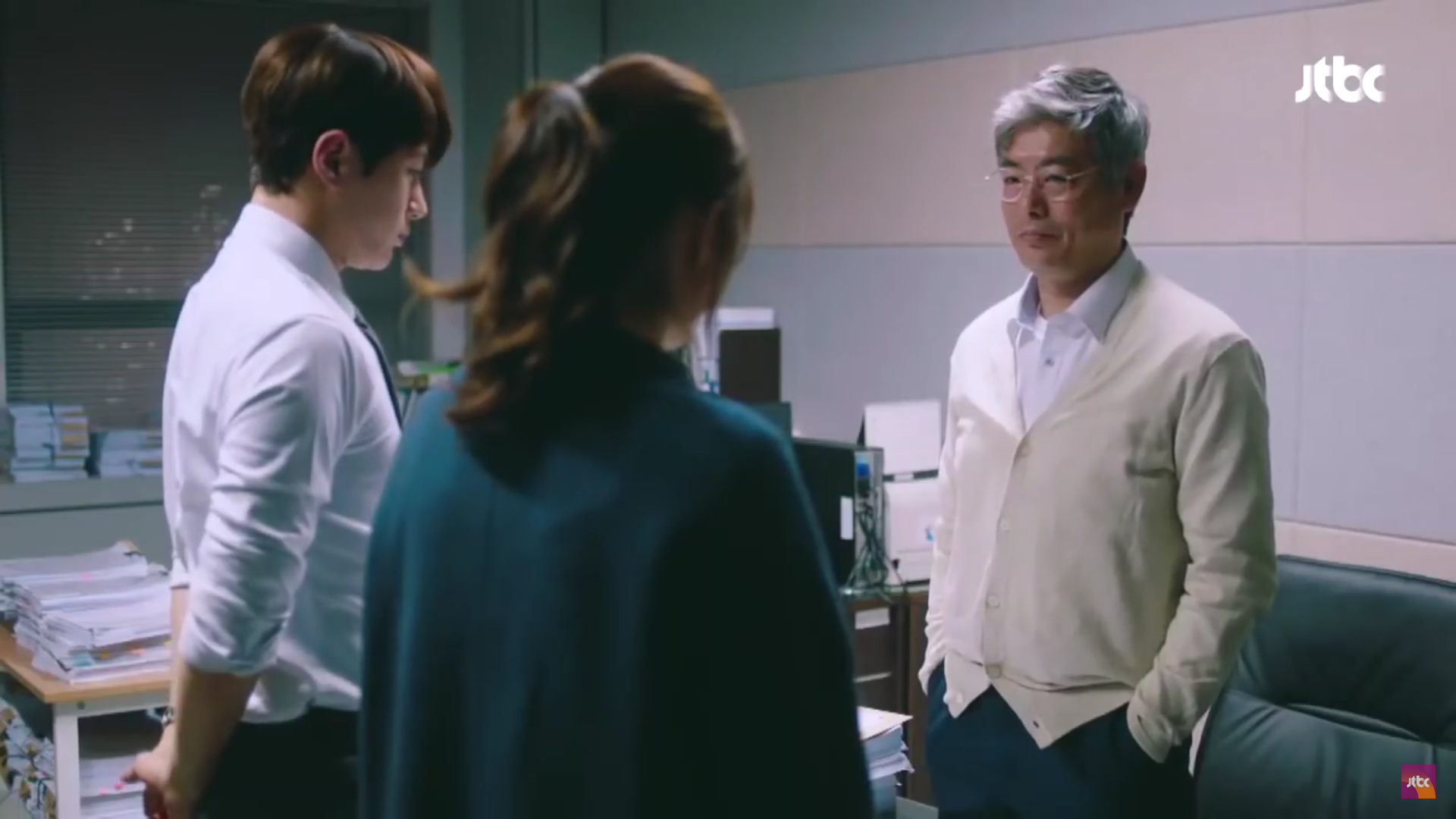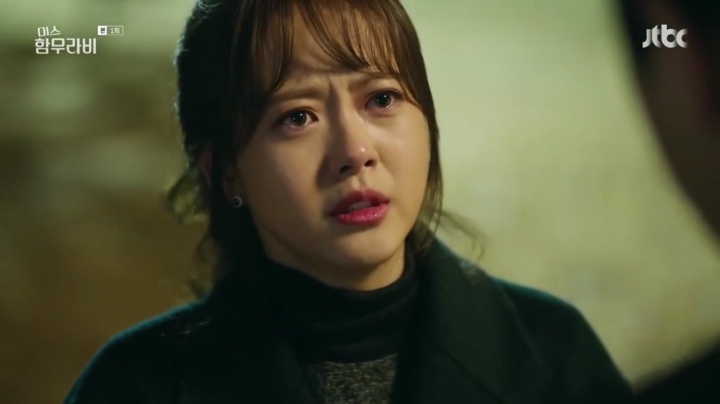Oppa and I were on a Reply 1994 high. Oppa super loved Go Ara as Na Jung. So he picked another Go Ara drama. Bonus was it also had Sung Dong Il. Oppa said I might love the next show because it was some sort of legal drama. So yes, we were looking forward to this one.
Story

Ms. Hammurabi is about judges working at the Central District Court in Seoul. The show starts on the first day of work of newly-appointed judge Park Cha Oreum (Go Ara). She is assigned to Civil Chamber 44 with Han Se Sang (Sung Dong Il) as its presiding judge and Lim Bareun (Kim Myung Soo or L) as the senior associate judge. Bareun and Oreum knew each other from a book club in high school but they lost touch after that. The story revolves around the struggles of Oreum as an idealistic judge who wants to change the world but finds it hard to do so given the established hierarchy and archaic practices in the court.
The Good
Oppa promoted this show as a legal drama. If I were to judge Ms. Hammurabi as a legal drama, then I would say that it failed to deliver. But if I forget about the legal and just focus on the drama then it would have served its purpose. It made me cry once in a while so it would be okay as a drama.
The show was interesting because it showed us a glimpse of the path you can take to have a legal or judicial career in Korea. It's cool that you can finish any degree and still end up a judge as long as you pass the exam. Oreum for instance was a music major.
Sung Dong Il as Han Se Sang

We loved Dong Il in Reply 1988 and Reply 1994. There's something very fatherly about him - scary when needed but mostly sweet and caring. We loved him so much that we're now watching House on Wheels on tvN. This show proved that I really love Dong Il. I didn't like the show that much but I still liked how Dong Il portrayed his character.

Just like his Reply characters, Dong Il was also a father figure here - in an office setting that is. He was like a father to his associate judges. He appeared strict, serious, and stern. But he also had his funny moments. I loved his usual deadpan delivery of his funny lines. But the best thing I loved about Han Se Sang was the silent way he loved and cared for his associates. He didn't say much, with another associate judge accusing him of not being there for Oreum when she was having a tough time. But he did not hesitate to punch a judge who was higher in rank when he heard the latter badmouthing Oreum. The office would be a happy place to work in if all bosses were like him. He was very generous in praising his staff. And I absolutely loved the compliment he gave Bareun and Oreum when he announced his retirement - he can now rest because he can see that with them, the future is bright.
Lee Elijah as Lee Doyeon

This is my second Lee Elijah drama. I first saw her in Wonderful Days. I already found her pretty then. And I would have to say she's gotten even prettier. Lee Doyeon was one of the few bright spots for this show. I loved the intriguing persona she projected. She was also a very efficient and smart employee. I liked that web writer twist too. Her snarky remarks were very adorable.
The Themes
In the beginning, the show looked promising. It was discussing big and very difficult issues and topics like women empowerment, gender equality especially in the workplace, patriarchal society, office politics, corruption and the old boys' club in the judiciary, the abuses of the privileged, the struggles of the underprivileged, violence against women including the battered woman syndrome, and the moral dilemmas that judges face, among others. Sounds good, right? Unfortunately, as I will cover later, the show failed to sustain and give justice to these things. It was not as bad as Ireland where they just lumped together stuff that they had no idea about. I appreciated the effort here but the way the show handled the issues was just lacking.
The Neutral - Go Ara as Oreum

We absolutely loved Go Ara in Reply '94. She was funny, angry, bratty, etc. It was refreshing to see her in a different role. But next to Na Jung, Oreum just really paled in comparison. Oreum had her moments. She tried her best to be upbeat despite the difficulties she was going through. I felt her pain from her traumatic childhood. I loved her passion for her advocacies. Oreum, on her own, would have been okay.
What I probably found most bothersome was her partnership with L as Bareun. I just didn't feel any chemistry between the two of them. The scenes that were supposed to give us the romantic vibes just felt so unnatural. So while Go Ara and Oreum were okay, this has to be classified as neutral because Oreum and Bareun together were not okay.
The Bad
L as Bareun
![ENG-SUB] MISS HAMMURABI - MYUNGSOO / L | Infinite Updates](https://infiniteupdates.net/sites/default/files/images/2018-2018-05/20180514_095309_5107.jpg)
My first impression of L was mmm, oppa-ble. He seemed intriguing because Bareun was a quiet character. But as the show progressed, I saw the light. L won't make it to my oppa list. I just found his acting too one-dimensional. And I believe this is the root cause of the lack of chemistry between Oreum and Bareun. I was so bothered that all throughout the series, he just banked on his one-sided smile to show off his dimples. I did not feel his passion or intensity even during the times he was lobbying/fighting for Oreum. He failed to match Go Ara's depth, unfortunately.
Execution
After watching the show, I would have to admit that I was quite disappointed that Go Ara and Dong Il did this drama. I found it poorly written and executed. Definitely a far cry from Reply. It was so bad that even good actors like these two could not save the show.

Ryu Deok Hwan as Judge Jung Bowang was supposed to be funny. But most of the time, I found his comedy quite slapstick, pretty much like his presiding judge's. It was unfortunate that Lee Doyeon had to be paired with someone like him. Although I guess opposites attract.
For a supposed legal drama, it was sad that the show was purely drama around 80% to 90% of the time, without necessarily being legalistic.
Handling of the Themes
As I mentioned earlier, I found the treatment of the difficult topics problematic. The show missed the opportunity to take on these issues in a realistic and natural manner. While there were attempts, the drama just really failed to integrate the topics naturally to the story. All storylines involving a topic were conveniently lumped together even if they were not built up properly or they didn't really make sense.
For instance, Bareun felt indifferent towards the poverty and struggles of the underprivileged and the abuse of power of the privileged. So the show made him experience it first hand. His mother, who appeared very healthy prior to this episode, fell ill and had to be rushed to the hospital. Doctors were ignoring them. So Bareun had to call his friend who owned the hospital and they were immediately prioritized, by-passing other patients who got there ahead of them. When Bareun realized his mistake, he apologized to the people he by-passed.
Another example was when Bareun and Bowang could not completely grasp the issue women had with catcalling. To help them understand, Oreum took them to the market and she had her ahjummas harass and catcall the boys.
There was also an episode where Chamber 44 had a quasi-rape case. So when Oreum and her friends went to the bar, they also saw an intoxicated girl who was about to be taken advantage of by two guys.
I just felt that all these things were done so conveniently, thus, making them unnatural. The thing is, it would have been doable. For instance, the issues of Oreum's mom as a battered woman and her dad who committed suicide were built up properly so we were not surprised when they were brought up later on.

I appreciated the show's efforts in attempting to touch on difficult topics. It was very idealistic. However, it had a very simplistic way of dealing with things. I would have preferred something that was more in touch with reality. For instance, in an effort to present the moral dilemmas judges faced, there were scenes when Oreum was already actively and openly advocating for a party. That was already tantamount to meddling with a case. It would be nice if judges can actually do that to help those who have less in life but there is also that danger of judges abusing that power to favor the powerful.
Presenting judges as advocates is actually problematic because it might give the public a wrong notion that judges can actually do that when in fact they cannot as they're supposed to be impartial. And when these people go to court and see that the judges are not actually advocating for them, this might cause trouble.
Ending
I was almost okay with the ending. It was touching to see Han Se Sang thanking everyone for their hardwork. It was his last trial prior to his retirement. However, the show had to add all those unnecessary scenes like young versions of Doyeon, Bowang, and Se Sang. It just turned the ending from something heartwarming to odd and weird.
At least we still managed to finish it even if we already had doubts from the beginning and we were calling it our "naptime." It was just disappointing because for something that had tremendous potential, the show was not able to maximize the various opportunities it had.
Oppa says...2.9.
Noona says...it's a 3.